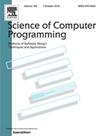编译器或解释器版本会影响编程语言的能耗吗?
IF 1.4
4区 计算机科学
Q3 COMPUTER SCIENCE, SOFTWARE ENGINEERING
引用次数: 0
摘要
软件在我们的日常活动中起着至关重要的作用。实际上,我们使用的所有技术都包含用特定编程语言编写的软件组件。在这种情况下,编译器和解释器扮演着重要的角色,因为需要它们将软件源代码转换成机器可以执行的格式。在一些研究中,编程语言对最终程序能耗的显著影响已经得到了强调。然而,关于编程语言的编译/解释器版本对能耗影响的研究几乎没有。本文旨在通过研究编译器/解释器版本对用C、Java和Python编写的程序的能耗的影响来填补这一空白。为此,我们进行了一项研究,使用基于硬件的能量测量方法来获得用三种语言编写的八种算法所消耗的能量,并使用不同的编译器/解释器版本运行。结果并没有显示出每种语言的不同版本之间有改进的趋势,特别是在能耗方面。这些结果表明,在开发编译器/解释器时,能源效率似乎不是一个主要因素,因此应该优先考虑。本文章由计算机程序翻译,如有差异,请以英文原文为准。
Does the compiler or interpreter version influence the energy consumption of programming languages?
Software plays a crucial role in our daily activities. Virtually all the technology we use contains software components written in a particular programming language. In this context, compilers and interpreters play an important role, as they are needed to convert the software source code into a format that can be executed by a machine. The significant influence of the programming language on the energy consumption of the resulting programs has been highlighted in some research. However, there is almost no research on the impact of the programming language compiler/interpreter version of the programming language on the energy consumption. This paper aims to fill this gap by investigating the impact of the compiler/interpreter version on the energy consumption of programs written in C, Java and Python. To do that we have performed a study that uses a hardware-based energy measurement approach to obtain the energy consumed by eight algorithms written in the three languages and run with different compiler/interpreter versions. The results do not show a trend of improvement between versions within each language, especially in terms of energy consumption. These results suggest that energy efficiency does not seem to be a major factor when developing compilers/interpreters and should therefore be prioritized.
求助全文
通过发布文献求助,成功后即可免费获取论文全文。
去求助
来源期刊

Science of Computer Programming
工程技术-计算机:软件工程
CiteScore
3.80
自引率
0.00%
发文量
76
审稿时长
67 days
期刊介绍:
Science of Computer Programming is dedicated to the distribution of research results in the areas of software systems development, use and maintenance, including the software aspects of hardware design.
The journal has a wide scope ranging from the many facets of methodological foundations to the details of technical issues andthe aspects of industrial practice.
The subjects of interest to SCP cover the entire spectrum of methods for the entire life cycle of software systems, including
• Requirements, specification, design, validation, verification, coding, testing, maintenance, metrics and renovation of software;
• Design, implementation and evaluation of programming languages;
• Programming environments, development tools, visualisation and animation;
• Management of the development process;
• Human factors in software, software for social interaction, software for social computing;
• Cyber physical systems, and software for the interaction between the physical and the machine;
• Software aspects of infrastructure services, system administration, and network management.
 求助内容:
求助内容: 应助结果提醒方式:
应助结果提醒方式:


